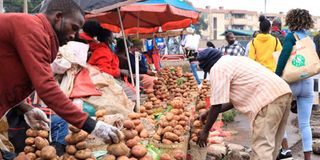National sit-down on quality of our potatoes overdue

Irish potatoes on sale outside Country Bus Station in Nairobi.
What you need to know:
- KFC blamed the shortage on delay in deliveries from its overseas suppliers, shocking local potato farmers.
- KFC was hailed for sticking to its quality standards but railed for its ‘patronising’ attitude.
The recent admission by the Kenyan franchise of global fast food chain KFC that it had run out of Irish potatoes to make chips rightly caused a nationwide furore. KFC blamed the shortage on delay in deliveries from its overseas suppliers, shocking local potato farmers who suffer perennial post-harvest losses due to glut.
Although KFC, through its East Africa CEO Jacques Theunissen, said the company would consider using local potatoes, the claim sharply divided Kenyans: KFC was hailed for sticking to its quality standards but railed for its ‘patronising’ attitude.
On the sidelines of the debate were competitors who took the opportunity to pitch for their chips, which they claimed were available, of good quality and produced using locally sourced potatoes.
However, the ‘potato wars’ exposed the country’s soft underbelly as regards its agricultural policy. Claims that KFC could not use local potatoes because they are substandard was a smack right in the face of the government — particularly the Ministry of Agriculture, National Potato Council of Kenya, Kenya Bureau of Standards (Kebs)—and the many researchers in academia who are experts in potato production and the entire value chain.
Irish potato is Kenya’s second-most important food crop after maize and claims that the produce is substandard raises serious concern. A Kenya Plant and Health Inspectorate Service (Kephis) report shows potato is grown by 800,000 small-scale farmers, generating employment for 2.5 million people and Sh40-50 billion revenues annually. But the crop requires attention in resources and long-term planning as it is a promising enterprise with a big role towards realising the Kenya Vision 2030.
International standards
But potato suffers a host of challenges — among them low yields occasioned by limited use of high-quality seed and other inputs; lack of proper on-farm storage facilities, leading to huge post-harvest losses; supply and price instability; lack of storage technical know-how by farmers; and poor produce due to pests, diseases or mechanical damage. The ministry, in the National Root and Tuber Crops Development Strategy (2019-2022), admits as such.
KFC’s quality concerns cannot just be wished away as they bring to the fore issues of national importance that calls for deeper introspection. They should not be seen as a corporate gaffe but a wake-up call for stakeholders to escalate conversation on this important crop for national prosperity.
It is the Kenyan farmer who loses when they are told that their produce, grown amid huge challenges, cannot meet international standards.
The ministry, potato council and Kebs should assure Kenyans about the safety and standards of local potatoes and the measures taken to improve them. The government has a responsibility to ensure that farmers grow quality and certified seeds that satisfy the local and international market.
Parliament and county assemblies also have an obligation to ensure there is a policy that seeks not only to protect but also promote the value chain of locally produced potatoes and markets.
Mr Mwangi is a communication consultant. [email protected]





